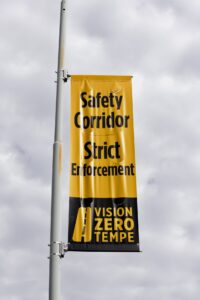Although stricter enforcement with added police patrols so far doesn’t seem to be more visible than usual, Tempe police are hoping the appearance of so-called Safety Corridor warnings along four of the city’s major thoroughfares will help reduce the tally of injury and fatal accidents. The messaging, displayed on banners hung from concurrent light poles in the selected areas, is designed to cut down on accidents.
“In 2023, there were 50 serious injury collisions on the streets of Tempe; of those, 24 people died from their injuries,” said Lt. Michael Hayes of the Tempe Police Department. In 2018, police set a goal for Tempe to become the first city in the country with zero traffic-related fatalities. The project, prototyped as Operation Safe Roads, represented a collaboration between Tempe PD and traffic engineers using analytics of the areas seeing the most collisions. Tempe Vice Mayor Jennifer Adams, who was helped lead the initiative’s development, says it demonstrates that Tempe is making strides when it comes to public safety on our streets. A resident of the Buena Vista Ranchos community, Adams says her concerns revolve around personal observation, as well as from people she knows elsewhere.

“I know we here in BVR hear it almost nightly, but street racing has been a huge concern all over the Valley. “On any given night, 50-200 street racers can move through 2- 4 different cities with preplanned routes, conducting intersection takeovers or other street racing activities. “Often, the number of street racers exceeds what Tempe, and many jurisdictions, have in their entire patrol division. She notes that Tempe PD is working closely with Phoenix PD and the Arizona Department of Public Safety’s Street Racing Task Force to help combat these issues.
Their strategy is multifaceted, but includes these tenets:
1. A multi-jurisdictional approach to garner enough resources and ensure safety
2. Good intelligence to effectively direct the resources
3. Strict enforcement once the issue is identified
4. Aggressive prosecution
“I’m proud to report that these efforts have resulted in 259 total street-racing related charges in 2023.” Most charges, she noted, were for excessive speeding. Reckless driving accounted for 62 of the charges. “Our attempts to combat street racing also proactively addresses the issue of loud noise from mufflers. Many of the vehicles causing excessive noise are modified to do so as part of the street racing culture. “By proactively working street racing issues, we are also working with the same vehicles that cause noise problems in our neighborhood.”
Between Jan. 15 and March 15, anyone pulled over for a traffic violation in Tempe will receive a ticket —no warning. There also will be an increase in digital radar speed signs around the City. Catherine Hollow, of the city’s Engineering and Transportation Department, said a review of Tempe’s so-called Safety Corridors uncovered conditions that helped city staff identify areas where added messaging might be beneficial. “Traffic engineers review each active Safety Corridor for needed updates, such as outdated signage, faded pavement markings or necessary adjustments to traffic signal timings,” Hollow noted. It was these areas that were thus flagged with large yellow banners on streetlights, alerting drivers to the Safety Corridor designation.
At the same time, Tempe PD expanded the mission of Vision Zero by adding more safety corridors along with better street signs, lighting and education emphasizing safer driving habits. This year’s efforts will be active in four different corridors that will change every three months, a modification from previous years in which active corridors remained in place for the entire year. Vision Zero is a strategy designed to help ensure safe, healthy, equitable mobility for all, according to planners.
First implemented in Sweden in the 1990s, the approach has been proven successful in other nations — and is said to be gaining momentum in American communities. It was launched in Tempe in 2018 by then-Mayor Mark Mitchell. According to ADOT director John Halikowski, in 2017, it was implemented “to address aggressive and impaired driving, speeding and lack of seat belt use…” In 2022, ADOT got rid of the program, but Tempe did not. While enforcement is designed to be part of the initiative, the slowed success of PD recruitment efforts recently is said to have temporarily reduced the number of officers available for that assignment. Safety Corridor 2024 locations
•Rural Road – 6th Street to Playa del Norte Drive
•University Drive – 52nd Street to Hardy Drive
•McClintock Drive – Baseline Road to Guadalupe Road
•Elliot Road – Interstate 10 to Kyrene Road


Tempe has had a policy of slowing traffic to mitigate deadly accidents. This policy should be titled, “Every light, every time”. This has created frustration with drivers and results in attempts to “beat the lights and leap frog slower traffic”. I believe this, not street racing is the major cause of most accidents. Traffic controls should be used to move traffic, not stop it. Years ago you could drive the speed limit and the lights, at least in Mesa, were timed so you hit most every light green. Tempe’s policy’s have cause congestion and frustration leading to more accidents.